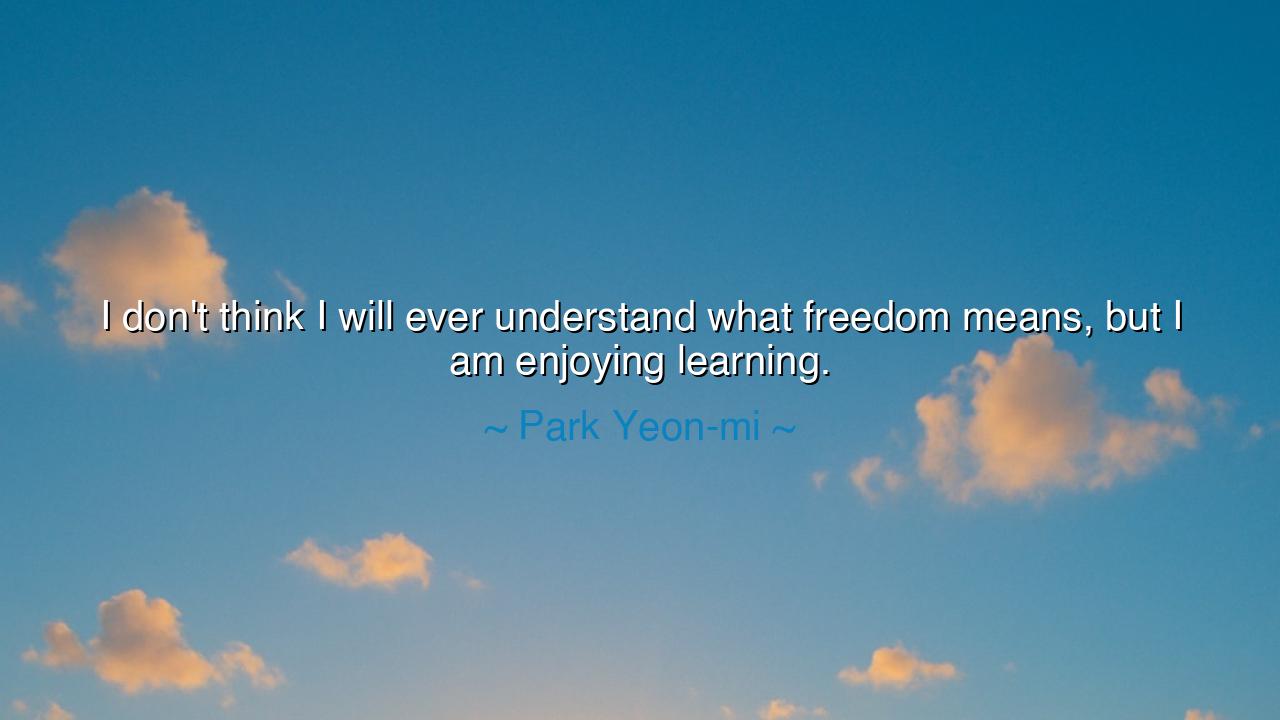
I don't think I will ever understand what freedom means, but I am






In the tender yet powerful words of Park Yeon-mi, there resounds a truth as ancient as the human soul: “I don’t think I will ever understand what freedom means, but I am enjoying learning.” Spoken by one who escaped the darkness of tyranny in North Korea and stepped trembling into the light of liberty, her confession carries the weight of generations who have hungered for dignity and choice. In these words is both humility and wonder — the acknowledgment that freedom, though sought by all, is not a single moment of liberation but an endless journey of discovery.
To not understand freedom is not ignorance, but reverence. For freedom, like the sky, cannot be fully grasped by the hand — it must be lived, breathed, and slowly comprehended through the heart’s awakening. Park Yeon-mi, who once lived in a land where every word was monitored, every thought controlled, and every hope forbidden, found herself in a world that suddenly allowed her to speak, to choose, to dream. And yet, such sudden vastness can be overwhelming. The enslaved bird, when first released, does not soar immediately; it hesitates, afraid of the very wind that now bears it aloft. Thus, her learning is sacred — the slow unfolding of a mind learning to trust the air of its own freedom.
The ancients would have understood her struggle. When Moses led his people out of Egypt, they too found that freedom was not easy to bear. Though their chains were gone, they longed at times for the familiarity of bondage, for freedom demands responsibility, self-knowledge, and courage. The desert became their classroom, and for forty years they learned what liberty truly meant — that to be free is not merely to live without a master, but to live with conscience, compassion, and purpose. Likewise, Park Yeon-mi’s journey is not from one land to another, but from one understanding of existence to another — from survival to awakening.
In her humility, she teaches us that freedom is not a destination, but a lifelong education. We may be born in lands that call themselves free, yet still live as prisoners of fear, greed, or conformity. To “enjoy learning” freedom is to recognize that liberty is not granted once and for all — it must be renewed every day through awareness and gratitude. It is to question, to think, to speak truthfully, to act justly even when silence and comfort are easier paths. True freedom is not merely the absence of chains, but the presence of character.
There is a story told of Socrates, who, though condemned by his own city, refused to flee his fate. When his friends urged him to escape, he answered, “I cannot dishonor the laws that raised me, even if they have now turned against me.” In that moment, he proved that freedom is not lawlessness, but mastery over one’s own fear and desires. Like Socrates, Park Yeon-mi’s discovery is not of external liberty alone, but of the inner freedom that comes from moral awakening — the freedom to think one’s own thoughts, to question power, and to choose compassion in a world often ruled by cruelty.
And yet, her words carry a quiet joy: “I am enjoying learning.” Despite the pain of her past, she delights in discovery. This joy is itself an act of defiance — a celebration of life’s capacity to heal. For one who has known oppression, even the simplest freedoms — to speak freely, to read what one wishes, to walk unafraid — become miracles. It is through gratitude that she learns freedom’s truest meaning: that liberty, unaccompanied by wonder, becomes hollow. The free soul must not only survive, but also rejoice.
Let this be the wisdom we pass down: Freedom is not given; it is cultivated. It begins with the courage to question falsehood, grows through the willingness to learn, and matures in the joy of understanding. The student of freedom must be patient, humble, and ever grateful, for the path is endless and luminous. To live freely is to learn eternally — to guard the mind against tyranny, the heart against hatred, and the spirit against despair.
And so, my children of the Earth, take heed of Park Yeon-mi’s truth: do not assume you understand freedom simply because you possess it. Instead, live each day as a lesson in liberation — learning to forgive, to think, to speak, to love without fear. For freedom, once truly understood, is not merely a right — it is a sacred way of being, a flame that must be tended, and a song that must be sung anew with every dawn.






AAdministratorAdministrator
Welcome, honored guests. Please leave a comment, we will respond soon